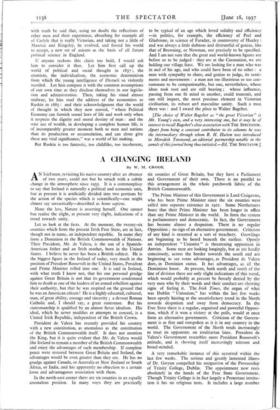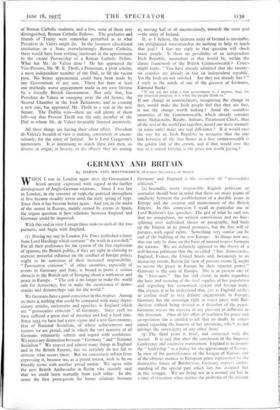A CHANGING IRELAND
By W. M. CROOK AN I rishman, revisiting his native country after an absence of two years, could not but be struck with a subtle change in the atmosphere since 1935. It is a commonplace to say that Ireland is naturally a political and economic unit, but at present it is artificially divided into two portions by the action of the species which is scientifically‚ÄĒone might almost say sarcastically‚ÄĒdescribed as homo sapiens.
None the less, Nature is asserting herself. One cannot but realise the slight, at present very slight, indications of a trend towards unity.
Let us look at the facts. At the moment, the twenty-six counties which form the present Irish Free State, are in fact, though not in name, an independent republic. In name they form a Dominion in the British Commonwealth of Nations. Their President, Mr. de Valera, is the son of a Spanish- American father and an Irish mother, born in the United States. I believe he never has been a British subject. He is the biggest figure in the Ireland of today, very much in the position of President Roosevelt in the United States, President and Prime Minister rolled into one. It is said in Ireland, with what truth I know not, that his one personal grudge against Great Britain is not that its government condemned him to death as one of the leaders of an armed rebellion against their authority, but that he was respited on the ground that he was an American citizen ! He is a highly educated, cultured, man, of great ability, courage and sincerity ; a devout Roman Catholic and, I should say, a great statesman. But his statesmanship is qualified by an almost fierce idealism. His ideal, which he never modifies or attempts to conceal, is a United Irish Republic, independent of the British Crown.
President de Valera has recently provided his country with a new constitution, as anomalous as the constitution of the British Commonwealth itself. It does not mention the King, but it is quite evident that Mr. de Valera would like Ireland to remain a member of the British Commonwealth and enjoy the advantages of such membership. If complete peace were restored between Great Britain and Ireland, the advantages would be even greater than they are. He has no grudge against Canada, or Australia or New Zealand or South Africa, or India, and has apparently no objection to a certain loose and advantageous association with them.
In the north-east corner there are six counties in an equally anomalous position. In many ways they are practically six counties of Great Britain, but they have a Parliament and Government of their own. There is no parallel to this arrangement in the whole patchwork fabric of the British Commonwealth.
The Prime Minister of this Government is Lord Craigavon, who has been Prime Minister since the six counties were called into separate existence in 1921. Some Northerners boast that their Prime Minister has been longer in office than any Prime Minister in the world. In form the system is parliamentary and democratic. In fact, the Government has become almost a despotism. There is no regular Opposition ; no sign of an alternative government. Criticism of any kind is resented as a sort of treachery. Growlings are beginning to be heard beneath the surface. Openly an independent " Unionist " is threatening opposition in Antrim. Some men are looking longingly, but as yet hardly consciously, across the border towards the south and are beginning to see some advantages, as President de Valera does, in Dominion status. It has advantages, as all the Dominions know. At present, both north and south of the line of division there are only slight indications of this trend, which would probably at present be fiercely denied by the very men who by their words and their conduct are_ showing signs of feeling it. The Irish Times, the organ of what was Dublin " Unionism," has within the last few weeks been openly hinting at the unsatisfactory trend in the North towards despotism and away from democracy. In the Free State there is a regular, organised and powerful Opposi- tion, which if it won a victory at the polls, would at once form an alternative government. Criticism of the Govern- ment is as free and outspoken as it is in any country in the world. The Government of the North tends increasingly to treat its opponents on totalitarian lines. President de Valera's Government resembles more President Roosevelt's attitude, and is showing itself increasingly tolerant and broad-minded.
A very remarkable instance of this occurred within the last few weeks. The serious and greatly lamented illness of Dr. Gwynn compelled his resignation of the Provostship of Trinity College, Dublin. The appointment now rests absolutely in the hands of the Free State Government. Though Trinity College is in fact largely a Protestant institu- tion it has no religious tests. It includes a large number of Roman Catholic students, and a few, some of them very distinguished, Roman Catholic Fellows. The graduates and friends of Trinity were somewhat perturbed as to what President de Valera might do. In the foremost educational institution in a State overwhelmingly Roman Catholic, there would have been nothing intolerant in the appointment to the vacant Provostship of a Roman Catholic Fellow. What has Mr. de Valera done ? He has appointed the Vice-Provost, Mr. W. E. Thrift, a Protestant, a great scholar, a most independent member of the Dail, to fill the vacant post. No better appointment could have been made by any Government of any sort. There has been at least one markedly worse appointment made in my own lifetime by a friendly British Government. Not only that, but President de Valera in sweeping away the old Senate, the Second Chamber in the Irish Parliament, and in creating a new one, has appointed Mr. Thrift to a seat in the new Senate. The Dublin wits‚ÄĒthere are still plenty of them left‚ÄĒsay that Provost Thrift was the only member of the Dail to whom Mr. de Valera invariably listened attentively.
All these things are having their silent effect. President de Valera's breadth of view is making, consciously or uncon- sciously, for the unity of Ireland. So is Lord Craigavon's narrowness. It is interesting to watch these two men, so diverse in origin, in history, in the objects they are aiming at, moving half or all unconsciously, towards the same goal ‚ÄĒthe unity of Ireland.
If, as I believe, the ultimate unity of Ireland is inevitable, can enlightened statesmanship do nothing to help to reach that goal ? I fear my reply to that question will shock many people. Is there no possibility of an independent Irish Republic, anomalous as that would be, within the elastic framework of the British Commonwealth ? Critics might reply, " You have already admitted that the twenty- six counties are already in fact an independent republic. Yet the Irish are not satisfied. Are they not already free ? " I reply in the words of one of the greatest of Irishmen, Edmund Burke :
" If any ask me what a free government is, I answer, that, for any practical purpose, it is what the people think so."
If any change in nomenclature, recognising the change in fact, would make the Irish people feel that they are free, is not the change worth making ? Amid the countless anomalies of the Commonwealth, which already contains more Maharajahs, Rajahs, Sultans, Paramount Chiefs, than all the rest of the world put together, would one more anomaly (in. name only) make any real difference ? If it would ease the way for an Irish Republic to recognise that the one link between all the free States in a free commonwealth is the golden link of the crown, and if that would ease the way to a united Ireland, is the price not worth paying ?















































 Previous page
Previous page